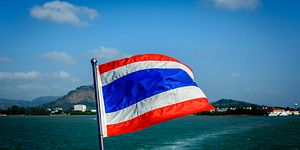On February 21, the Constitutional Court ruled to dissolve the newly formed Future Forward Party, which stormed to a third-place finish in its first ever election last March. While the dissolution of a major political party might feel like a final act, in Thailand it has left the pro-democracy movement in limbo.
FWP faced its first dissolution case in January but was spared to the surprise of some. The complaint accused FWP of seeking to overthrow the monarchy, but was riddled with absurdities – like the claim that the party was connected to the Illuminati because its symbol is a triangle.
FWP likely escaped the first attempt because the powers that be recognized that such a ridiculous accusation would reflect badly on the establishment, and perhaps the monarchy did not want to be explicitly linked to its dissolution.
Instead, the Constitutional Court took out the nascent party on a more believable charge – that it had taken an illegal multi-million dollar loan from its wealthy founder, Thanathorn Juangroongruangkit. The party’s dissolution, and Thanathorn’s own expulsion from parliament in November, are both widely seen as politically motivated.
The dissolution inevitably drew comparisons to the 2017 dissolution of the pro-democracy opposition in Cambodia, the Cambodia National Rescue Party. Both dissolutions were widely condemned as arbitrary and a blow to democracy. Both parties had leaders banned from politics for a number of years. But there are key differences. The CNRP was dissolved shortly before the 2018 election, guaranteeing that the ruling party would take every National Assembly seat in the two-party environment. FWP was dissolved after the election, meaning most of its MPs will remain in parliament. Thailand also has a true multi-party system, so those MPs can remain part of a broader coalition with the opposition Pheu Thai party, which actually won the most votes but not enough to overcome an electoral system rigged in the military’s favor.
But there was always a special sheen to FWP that Pheu Thai didn’t have. The party was fresh, a break from the repetitive cycle of conflict between the military and Thaksin Shinawatra. It inspired belief in the new generation that democracy could rise again. Now that belief is on ice, but not completely crushed like it is in Cambodia.
Students have organized their own protests at various universities to express support for the party. Party representatives have told me for now they are happy to allow demonstrations to pop up spontaneously and don’t yet have plans to call for more widespread protests.
There’s a simmering anger amongst the party’s six million supporters. Those that I’ve spoken to seem prepared to participate in large scale demonstrations, but they fear this would lead to violence and worry protesting won’t actually change anything.
Just as the CNRP rebranded itself to the Cambodia National Rescue Movement, FWP also announced the formation of the Future Forward Movement and said the remaining MPs will form a new political party (maybe more than one), which the FWP executive leadership will have no involvement in. However, nine have already defected to the ruling coalition, casting doubts on the FWP’s ability to keep MPs loyal. In comparison, the CNRP’s first two defections only came more than two years after its dissolution.
The ruing leaves FWP in a strange position, because technically many of its members are still in politics. The illusion that the party could still change politics from the inside is preserved, if damaged. The dissolution was a signal that true reform will not be tolerated, and it’s obvious that the walls are closing in on the party. At the same time, the already insecure military regime continues to damage its own legitimacy.
Many see Prime Minister Prayut Chan-o-cha’s authority as increasingly tenuous. But much analysis has understandably steered clear of mentioning the king. While Prayut’s authority may be waning, the king continues to consolidate more control, a development FWP cannot ignore as it deliberates whether it should continue resisting from within the system or outside of it.

































